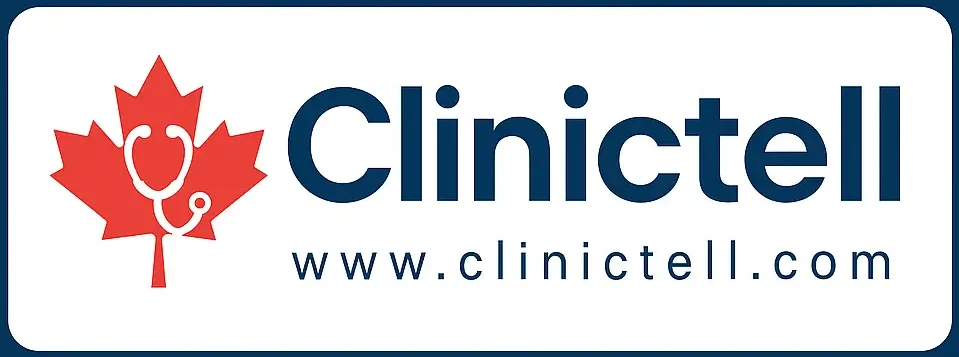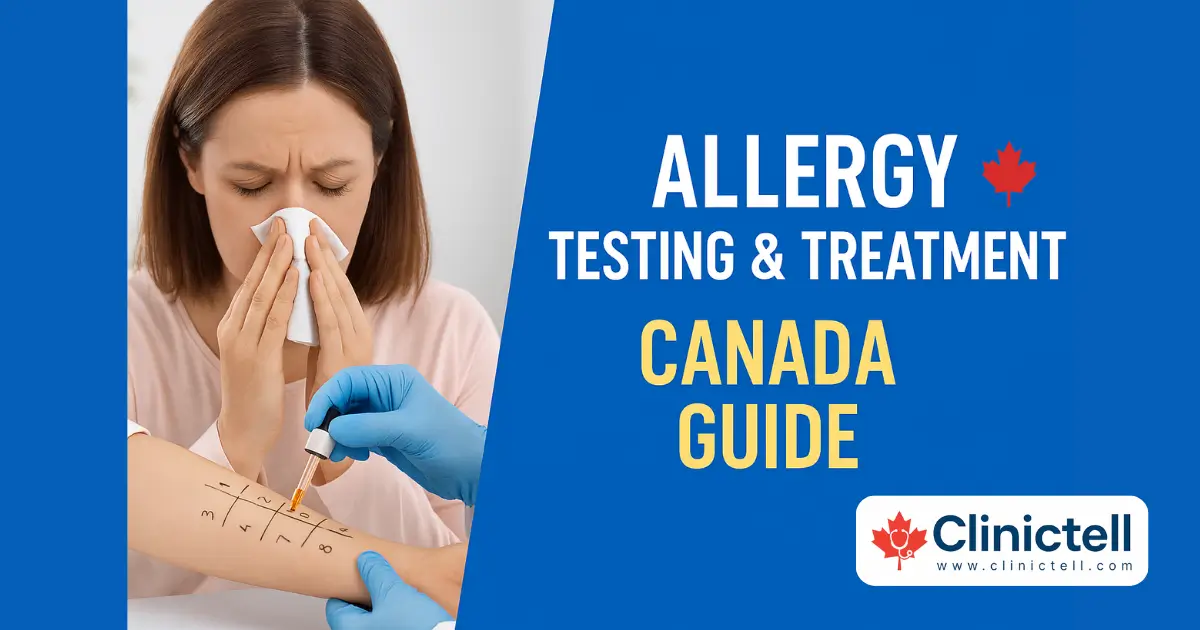Struggling with allergies? Our complete guide covers allergy testing options across Canada, treatment costs, finding allergists, and managing symptoms. Learn about skin prick tests, immunotherapy, and provincial healthcare coverage.
Discover allergy testing options, costs, and top allergists in Canada. Learn about symptoms, treatments, and how to breathe easier. Breathe easier with the right allergy care.
Introduction
Allergies affect millions of Canadians, with symptoms ranging from mild sneezing to severe anaphylaxis. Whether you’re dealing with seasonal allergies, food intolerances, or chronic immune reactions, getting the right diagnosis and treatment is crucial. This guide covers everything you need to know about allergy testing in Canada, including:
- Common allergy symptoms and triggers.
- Types of tests available (skin prick, blood tests, patch tests).
- How to find a trusted allergist doctor near you.
- Treatment options, from medications to immunotherapy.
- Costs and provincial healthcare coverage.
By the end, you’ll have a clear action plan to manage allergies effectively.
Common Allergy Symptoms in Canada
Allergies manifest differently depending on the trigger. Here are the most frequent symptoms reported by Canadians:
Seasonal Allergies (Pollen, Mold)
- Sneezing, runny or stuffy nose.
- Itchy, watery eyes.
- Postnasal drip and throat irritation.
Food Allergies
- Hives, swelling (lips, face, throat).
- Digestive issues (nausea, vomiting).
- Anaphylaxis (difficulty breathing, dizziness).
Environmental & Chemical Allergies
- Skin rashes (eczema, contact dermatitis).
- Asthma flare-ups.
- Headaches or fatigue.
Did You Know? According to Health Canada, over 20% of Canadians suffer from allergic rhinitis (hay fever), making it one of the most common chronic conditions.
Types of Allergy Tests Available in Canada
Accurate diagnosis starts with the right test. Below is a comparison of the most common allergy test Canada options:
| Test Type | Method | Accuracy | Best For | Wait Time for Results |
|---|---|---|---|---|
| Skin Prick Test | Small allergen droplets on skin; pricked with a needle. | High | Pollen, food, pet allergies. | 15–20 minutes. |
| Blood Test (IgE) | Blood sample analyzed for allergen antibodies. | Moderate to High | Severe skin conditions, multiple allergens. | 1–2 weeks. |
| Patch Test | Allergen patches applied to skin for 48 hours. | High | Contact dermatitis (metals, cosmetics). | 2–3 days. |
Which Test is Right for You?
- Skin prick tests are the gold standard for quick results.
- Blood tests are ideal if you can’t stop antihistamines before testing.
- Patch tests diagnose delayed skin reactions.
For severe cases, the Canadian Society of Allergy and Clinical Immunology (CSACI) recommends consulting a specialist to determine the best approach.
How to Find the Best Allergist in Canada
Finding a qualified allergist doctor is crucial for accurate diagnosis and personalized treatment. Here’s how to locate top specialists across Canada:
Provincial Allergist Directories
Each province has its own medical licensing bodies and allergy clinics. Below is a breakdown of resources:
| Province | How to Find an Allergist | Public vs. Private Options |
|---|---|---|
| Ontario | Referral from family doctor required for public clinics. Private clinics offer direct bookings. | Public: Covered by OHIP. Private: $200-$500 per test. |
| British Columbia | Use the College of Physicians and Surgeons of BC to verify credentials. | MSP covers basic tests; advanced testing may be out-of-pocket. |
| Alberta | Alberta Health Services provides allergist referrals through AHS Connect. | Limited public availability; private clinics faster but costly. |
| Quebec | RAMQ covers testing with referral; private clinics in Montreal offer same-day appointments. | Public wait times: 3-6 months. |
Tip: For food allergy testing, look for clinics affiliated with Food Allergy Canada, a leading advocacy group with vetted resources.
What to Ask During Your First Visit
- “What tests will you perform, and why?” (Ensure they match your symptoms.)
- “Do you offer immunotherapy (allergy shots or drops)?”
- “What’s the total cost if I’m uninsured?”
Allergy Treatment Options: Beyond Antihistamines
While over-the-counter antihistamines help mild cases, chronic allergies often require advanced treatments.
Medical Treatments
| Treatment | How It Works | Best For | Pros & Cons |
|---|---|---|---|
| Antihistamines (e.g., Reactine) | Blocks histamine release. | Seasonal allergies, mild reactions. | Pros: Fast relief. Cons: Drowsiness (1st-gen). |
| Nasal Corticosteroids (e.g., Flonase) | Reduces nasal inflammation. | Chronic sinus issues. | Pros: Long-term use safe. Cons: Takes days to work. |
| Immunotherapy (SLIT/SCIT) | Gradual allergen exposure to build tolerance. | Severe pollen/dust mite allergies. | Pros: Long-term remission. Cons: 3–5 years of treatment. |
Did You Know? A study published in the Canadian Medical Association Journal found that sublingual immunotherapy (SLIT) reduces symptoms in 85% of pollen allergy patients within 1 year.
Natural Remedies (Evidence-Based)
- Local honey: Limited evidence for pollen adaptation.
- HEPA filters: Reduce airborne allergens by 99%.
- Saline rinses: Flush out nasal irritants (supported by Health Canada).
Warning: Avoid unproven “allergy cures” like detox teas, which lack scientific backing.
Cost of Allergy Testing in Canada: Public vs. Private
Understanding the financial aspect of allergy care helps Canadians make informed decisions. Costs vary significantly between public healthcare and private clinics.
Public Healthcare Coverage by Province
| Province | Covered Tests | Out-of-Pocket Costs | Wait Times |
|---|---|---|---|
| Ontario (OHIP) | Basic skin prick tests | Free with referral | 2-6 months |
| Quebec (RAMQ) | Initial allergy screening | Free | 3-8 months |
| British Columbia (MSP) | Limited blood tests | Free | 4-9 months |
| Alberta (AHCIP) | Diagnostic testing | Free with referral | 3-7 months |
Note: Complex tests like component-resolved diagnostics (CRD) for food allergies are rarely covered publicly. The Canadian Allergy, Asthma and Immunology Foundation provides grants for families needing advanced testing.
Private Clinic Costs
| Test Type | Average Cost Range | Turnaround Time |
|---|---|---|
| Skin prick panel | $150-$300 | Same-day results |
| Comprehensive IgE blood test | $300-$600 | 5-7 business days |
| Food allergy component test | $400-$800 | 7-10 business days |
| Patch testing | $250-$500 | 48-72 hour wait |
Tip: Some extended health plans through employers may cover 50-80% of private testing costs. Always check with your provider first.
When to Seek Emergency Care
While most allergies are manageable, some symptoms require immediate medical attention:
Red Flag Symptoms
- Swelling of lips/tongue that affects breathing
- Sudden drop in blood pressure
- Loss of consciousness
- Widespread hives with dizziness
The Canadian Anaphylaxis Network recommends carrying epinephrine auto-injectors if you have a history of severe reactions. Public health units often provide training on proper use.
Seasonal Allergy Preparedness Guide
Monthly Allergy Calendar for Canada
| Month | Primary Allergens | Prevention Tips |
|---|---|---|
| March-May | Tree pollen (birch, maple) | Keep windows closed during high pollen counts |
| June-Aug | Grass pollen | Shower after outdoor activities |
| Aug-Oct | Ragweed | Use HEPA filters indoors |
| Nov-Feb | Indoor molds/dust mites | Maintain humidity below 50% |
Regional Note: Coastal BC residents experience mold allergies year-round, while prairie provinces have intense ragweed seasons.
Emergency Preparedness for Severe Allergies
For Canadians with life-threatening allergies, proper emergency planning can be lifesaving. Here’s what you need to know:
Essential Components of an Allergy Emergency Kit
| Item | Purpose | Where to Obtain |
|---|---|---|
| Epinephrine auto-injector (EpiPen, Allerject) | Treats anaphylaxis | Prescription from allergist |
| Antihistamines (liquid & tablet forms) | Mild reaction management | Over-the-counter |
| Medical alert bracelet | Identifies allergies during emergencies | Canadian MedicAlert Foundation |
| Emergency action plan | Step-by-step response guide | Allergy Asthma Information Association |
Health Canada recommends that all allergy kits include at least two epinephrine doses, as 20% of anaphylactic reactions require a second dose.
Creating an Allergy-Safe Environment
For Schools & Workplaces:
- Request allergen-free zones
- Ensure staff complete anaphylaxis training
- Post emergency procedures visibly
At Home:
- Store emergency medications at room temperature
- Check expiration dates monthly
- Inform household members about kit locations
The Canadian Paediatric Society provides free templates for creating customized allergy action plans suitable for all ages.
Additional Resources for Allergy Sufferers
Support Organizations Across Canada
| Organization | Services Offered | Geographic Focus |
|---|---|---|
| Food Allergy Canada | Education, advocacy, research | Nationwide |
| Asthma Canada | Allergy-asthma connection resources | Provincial chapters |
| Canadian Society of Allergy and Clinical Immunology | Specialist referrals | Academic centers |
Mobile Apps for Allergy Management
- AllergyEats Canada (restaurant allergen guides)
- Pollen Wise (real-time pollen forecasts)
- My Allergy (symptom tracking & medication reminders)
These digital tools integrate with most provincial health portals, allowing users to share data with their healthcare providers.
Conclusion: Taking Control of Your Allergy Health
Managing allergies in Canada requires a proactive approach combining accurate testing, appropriate treatment, and ongoing vigilance. By understanding:
- The full range of diagnostic options
- Provincial coverage differences
- Emergency preparedness essentials
- Available support resources
Canadians can make informed decisions about their allergy care. Remember that allergy patterns and treatments evolve – regular follow-ups with an allergist ensure you benefit from the latest advancements.
FAQ
How much does allergy testing cost in Canada?
Public healthcare covers basic tests with a doctor’s referral, while private clinics charge $150-$800 depending on test type. Skin prick tests average $200-$300 privately.
What’s the most accurate allergy test?
Skin prick tests are considered the gold standard for most allergies, with 90-95% accuracy when performed by certified allergists.
Can I get allergy testing without a doctor’s referral?
Yes, private clinics accept self-referrals, but public healthcare requires a GP referral for coverage.
How long do allergy test results take?
Skin tests show reactions in 15 minutes, blood tests take 1-2 weeks, and patch tests require 48-72 hours for results.
Are home allergy test kits reliable?
Health Canada advises caution with at-home kits as they often give false positives. Clinical tests with allergists are more accurate.


About Author
Related Posts
Understanding Radiology & Imaging Services in Canada: MRI, CT, Ultrasound Explained
Canadian Immigration & Health Requirements 2025: Medical Exams, Coverage, and What to Expect
Mental Health Crisis in Canada 2025: Trends, Barriers & How to Get Support
Healthcare in Canada 2025: How It Works for Residents & Newcomers